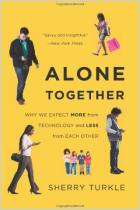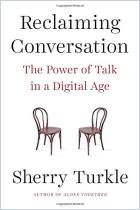加入 getAbstract 阅读摘要

加入 getAbstract 阅读摘要
Sherry Turkle
Humans First – Technology Second, with Sherry Turkle
Global Peter Drucker Forum, 2015
看看什么内容?
Electronic devices have inadvertently made individuals more introverted.
Recommendation
As a professor at the Massachusetts Institute of Technology, Sherry Turkle is accustomed to addressing large audiences, a trait that might inhibit this seasoned speaker from relating to the anomaly she discusses: The advent of new technologies has prompted many people to eschew face-to-face conversation and to favor text-based exchanges over spoken dialogues. Using two examples from her research, Turkle eloquently explains how this trend is reshaping interpersonal communication and why it matters. getAbstract recommends her thought-provoking presentation to all people who have noticed their introversion growing in tandem with their reliance on electronic devices.
Summary
About the Speaker
Sherry Turkle is the director of MIT’s Initiative on Technology and Self. She wrote Alone Together.

























Comment on this summary